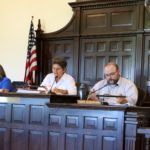County administrator gives commissioners 3 options for putting mental health projects on ballot

photo by: Elvyn Jones
Douglas County Commissioners consider Wednesday, July 11, 2018 one of the options to put a ballot question before voters in November to fund construction and the operation of a behavioral health campus on the November general election ballot. Commissioners will further discuss the options presented Wednesday at upcoming meetings. From the left the commissioners are Michelle Derusseau, Nancy Thellman and Mike Gaughan.
County Administrator Craig Weinaug presented Douglas County commissioners Wednesday with three funding options that they could use to craft a ballot question about mental health projects — one that he thought was too big, one that he thought was too small and one that would delay the projects until 2020.
Wednesday’s discussion centered on finding new ways to pay for the projects laid out in Proposition 1, a ballot question that voters rejected earlier this year. Proposition 1 asked voters to approve a half-cent sales tax to fund a $44 million county jail expansion and an $11 million behavioral health campus and provide about $5 million a year for new behavioral health programming.
Weinaug said commissioners could choose to ask voters about the following funding mechanisms:
• Approving 4.3 mills in additional property tax authority to provide the $5.75 million needed to retire debt for the campus and pay for expanded behavioral health programming.
• Approving a half-cent sales tax under the same state statutory authority used in Proposition 1. Weinaug estimated that tax would raise $9.8 million a year.
• Approving a quarter-cent sales tax through a state statute that Wichita attorney Mary Carson brought to the county’s attention this week. Justice Matters, a Lawrence faith-based social advocacy organization, hired Carson to identify ways to put a question on the November ballot. Weinaug estimated a quarter-cent tax would provide $4.9 million annually.
Weinaug said he started researching the quarter-cent sales tax option Tuesday. From consultations with Carson and county counselor John Bullock, he concluded that a quarter-cent tax could be put on the ballot, but it would generate $800,000 less per year than the annual amount set out in Proposition 1 to fund behavioral health projects. The half-cent sales tax option, meanwhile, would generate $4 million more than necessary each year, he said.
The property tax option was the only alternative that could be crafted to pay for the $5 million in additional behavioral health programming each year and provide the $750,000 needed annually to retire debt for construction of the campus, Weinaug said. The problem with that just-right funding option is it would delay construction of the campus because the additional revenue from the property tax wouldn’t start to be collected until January 2020.
If either of the sales taxes were approved, the county would start collecting revenue from the new tax two or three months after the vote, Weinaug said.
Commission Chair Nancy Thellman thanked Justice Matters for bringing the quarter-cent sales tax to the county’s attention, but asked Weinaug to ensure the option could be used for all of the Proposition 1 projects, including transitional and long-term housing for individuals with behavioral health needs.
The new quarter-cent option left her with a dilemma because she was starting to consider what new behavioral health programming could be funded in a new ballot question, Thellman said. There were enough unfunded needs to account for all the $9.8 million a half-cent sales tax would provide without sweeping existing mental health spending into the language of a ballot question, she said.
The commission’s use of a sales tax for behavioral health programs that are currently funded through property taxes could be controversial because that would allow the county to use that property tax authority to fund an expansion of the county jail.
During public comment, resident Charlie Ross encouraged commissioners to think big.
“For the last 20 years, I’ve seen spending for mental health go down,” he said. “That’s criminal. When you talk about talk about scaling down a project or scaling up, please scale up.”
Thellman said the commission would meet to consider the ballot question again at 6 p.m. July 18. Weinaug said commissioners needed to make a decision about ballot language by the end of August if the question was to be on the November ballot.





